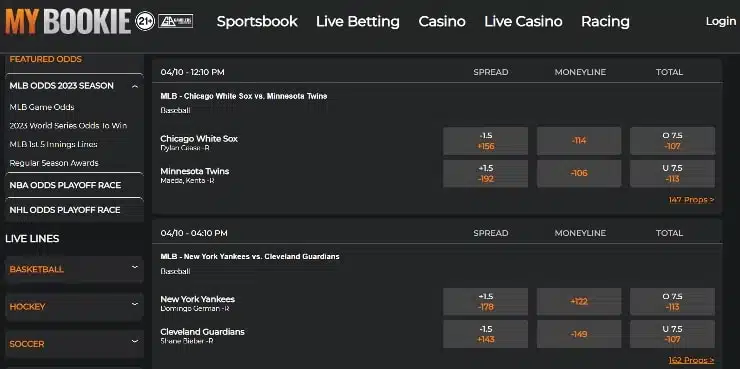In sports betting, “fade” is a term used to describe betting against a particular team or player. For example, if you think that a team is overrated or not worthy of being the betting favorite, you might choose to “fade” them by placing a bet on their opponent. By doing so, you are essentially betting that the underdog will win and thus putting yourself in the position to cash in on big wins.
For instance, using an NBA betting example, imagine a match-up between the Boston Celtics and the Chicago Bulls. The Celtics are riding a three-game winning streak, while the Bulls have lost their last three games. In this scenario, it’s likely that the majority of wagers will be placed on the Celtics to win. However, by betting against the consensus and wagering on the Chicago Bulls, you can capitalize on the high potential payouts that come with fading the popular choice.
Obviously, “fading” can be a risky strategy, as there is always a chance that the team you are betting against may end up winning the game or covering the spread. However, it can also be a profitable strategy if you have done your research and have a good understanding of the teams or players involved.

Why Should You Fade a Team?
A bettor may choose to fade a team for various reasons, though no single rationale consistently outperforms the others. Key factors that could justify fading a team include the team’s recent performance, player injuries, subpar team chemistry, extensive travel time, ineffective coaching, or home-field advantage.
Fading a team often entails betting against the favorite, which can result in a more substantial payout if successful. Essentially, the value of fading a team lies in recognizing when the public’s enthusiasm for the favored side skews the odds or point spread, thereby increasing the potential payout. In such cases, a strategic fade may prove to be a lucrative decision.
Why Should You Fade a Handicapper?
At times, you may unknowingly select a handicapper who’s currently underperforming. For example, you might choose a handicapper with a documented 60% winning percentage but then find yourself in the midst of their losing streak. So, how can you turn this situation to your advantage? Well, this is where you can make contrarian bets, which is, essentially, fading a handicapper. For example, if the handicapper selects the Pittsburgh Steelers, place your bet on the Philadelphia Eagles instead.
This approach allows you to capitalize on their losing streak while still benefiting from their analysis and expert insights. It’s a good idea to monitor the handicapper’s performance to determine when their losing streak ends. Just like teams and players, handicappers also experience ups and downs. Also, a handicapper may become overconfident after a series of successful predictions, leading them to make riskier or less-informed picks.

Fading an overconfident handicapper can be a profitable NBA betting strategy in such instances. Once the handicapper’s winning form returns, you can then consider following their picks. Remember that subscribing to a handicapper’s picks doesn’t obligate you to follow their advice. You can make your own decisions while still utilizing their expertise. The key is to stay calm during a losing streak and use your handicapper’s performance to guide your betting strategy, even if it’s in a reverse manner. This way, you can still find success in sports betting, regardless of your handicapper’s current performance.
Why Should You Fade the Betting Public?
First, it’s important to grasp the underlying concept of fading the betting public. The idea is straightforward: since recreational bettors or even most bettors tend to lose in the long run (hence the saying “the house always wins”), betting against the general consensus can be profitable. When the public consensus is reached on a specific market or team, the odds shift accordingly. Fading the public involves capitalizing on these lengthened odds by taking the opposite position.
Experienced bettors often adopt this strategy, as it can prove lucrative in certain situations. The rationale is that the public may be swayed by factors such as emotions, hype, and media coverage, leading to mispriced odds. By betting against the crowd, you can capitalize on these biases and inefficiencies in the odds.
There are several reasons to consider fading the public:
- Casual bettors may be influenced by factors like team popularity, recent performances, or media narratives, skewing the public consensus. By going against the crowd, you can potentially exploit these biases and find value in the odds.
- The public may overreact to recent events or injuries, causing disproportionate odds shifts. Betting against the public can reveal value in situations where the odds have swung too far in one direction.
- Fading the public often requires a contrarian mindset, which can be beneficial in sports betting. This strategy encourages critical and analytical thinking about games, rather than simply following the crowd.
- The majority of the betting public are recreational bettors who may lack the knowledge or expertise of professional bettors. In fact, many of them wouldn’t even know the answer to “what does fade mean in betting?” So by fading the public, you can capitalize on this knowledge gap and potentially score significant wins.

Best Bet Types to Fade the Betting Public
Now that you know the answer to “what does fade mean in betting” and why it’s a good idea to fade the betting public, let’s have a look at the best bet types suited for this betting style. There are three in particular that stand out, which we’ll take a closer look at here:
- Point spread: Point spread lines move when there’s a significant influx of money in one direction. Fading the public in these situations allows access to better or improved odds.
- Over/under totals: Similarly, over and under totals move based on public consensus, potentially even more so than point spreads. Bookmakers aim to balance money on both sides of the market, so they react to public betting trends. If you believe the public consensus is misaligned with the points total’s movement, it could be an ideal time to fade the public.
- Moneyline: Casual bettors often have a bias towards favorites and high-scoring teams, which can result in inflated odds for the favorite. By identifying situations where the public is heavily backing the favorite, you can find value in betting against the favorite and backing the underdog on the moneyline.
When Should You Avoid Fading?
As a general rule of thumb, it’s advisable to steer clear of fading when a team consistently demonstrates superior performance or when the betting public becomes aware and begins wagering on the fade. In such situations, the potential value diminishes, rendering the fade less of a wise choice. Also, fading might not be a good idea when there is a clear mismatch in talent, skills, or experience between the teams, as this could lead to a predictable outcome. Basically, it’s not worth fading when reliable data and statistics strongly support the favored team’s chances of success.

In such cases, going against the odds may not offer substantial value and could result in losses. It’s also wise to steer clear of fading when external factors, such as travel times, altitudes, or venue, favor the stronger team, as these can further tip the scales in their favor. Lastly, don’t fade when you lack a solid rationale for doing so. Fading for the sake of being contrarian or out of emotion can lead to poor decision-making and a high chance of losses. Always base your betting decisions on comprehensive research, analysis, and a well-thought-out strategy.
Tail vs. Fade
Before you make a fade bet, you should also consider tail betting. By understanding both “what does fade mean in betting” and tail betting, you can determine the most effective approach for your wagering strategy. There are arguments in favor of each strategy, so it’s essential to understand them to make informed decisions.
Fade
Fading involves betting against popular opinion. This strategy is based on the idea that offshore sportsbooks often profit from public betting patterns, which means fading can be a good situational strategy.
For example, if the media or public betting consensus appears overly influenced by a particular narrative, and sharp bettors are lining up on the opposite side, it may be advantageous to follow the sharps. Keep in mind, though, that sharps can also suffer losses, and blindly fading the public can result in losses.
Tail
On the other hand, tailing means following the popular opinion. Although sharp bettors are often portrayed as consistent winners, they can lose just as often as recreational bettors. In fact, the betting public is actually accurate more often than they get credit for, leading to significant wins for those who tail it.
For example, during the NBA Finals between the underdog Denver Nuggets and the favored Los Angeles Lakers, the public accurately made successful NBA picks and predicted the Lakers’ triumph. Nevertheless, just like with fading, blindly backing the public consensus without weighing additional factors can lead to losses.

Strategies for Fading a Bet
One of the biggest mistakes you can make when making a fade bet is to go in blind without a strategy. So, to help you find success with your fade bets, here are ten strategies put together by our experts that reflect the concept of “what does fade mean in betting”:
- Understand Reverse Line Movement: Pay attention to situations where the betting line moves in the opposite direction of public opinion. This could indicate that sharp bettors are placing large bets on the other side. However, be cautious and don’t blindly follow reverse line movement, as it cannot guarantee a win.
- Bet on the Right Number: Successful sports betting is about finding the best line, not just the right team. Take the time to line shop and ensure you’re getting the best value for your bet. Avoid chasing steam, as you need to follow the sharp bettors at the same number they have to truly be on the smart money side.
- Identify Overhyped Teams: Look for teams that receive excessive media attention, have a large fan base, or are on a winning streak. These factors may cause the public to overestimate their chances of winning and will ultimately create an excellent opportunity to fade the bet.
- Don’t Blindly Bet on Over/Under Totals: While it may be tempting to fade the public by betting unders, as people tend to favor overs when totals betting, the data shows that blindly betting on either side will often result in losses. Focus on finding value and making informed decisions rather than relying on a single betting rule.
- Focus on Long-term Success: Sports betting is a marathon, not a sprint. Consistently following best practices and learning from your mistakes will lead to better results over time.
- Remain Flexible and Adaptable: The world of sports betting is constantly evolving. Be open to adjusting your strategy and adapting to new trends to stay ahead of the curve and continue finding value in fading bets.
- Assess Injuries and Roster Changes: Stay informed about injuries, suspensions, or roster changes that could affect a team’s performance. If the betting public is unaware of these factors, you might find value in fading their bets.
- Consider Emotional Factors: Be aware of emotional factors, such as rivalries or revenge games, because these could impact a team’s performance. If the public is overly influenced by these factors, fading their bets may prove profitable.
- Be Selective and Patient: A fade bet can be risky. Because of this, don’t fade every bet that catches your eye. Instead, wait for the right opportunities that offer value and align with your analysis.
- Stay Updated on Betting Trends: Keep up to date with the latest trends, strategies, news, and information in the sports betting world. This knowledge will help you make more informed decisions when fading bets.